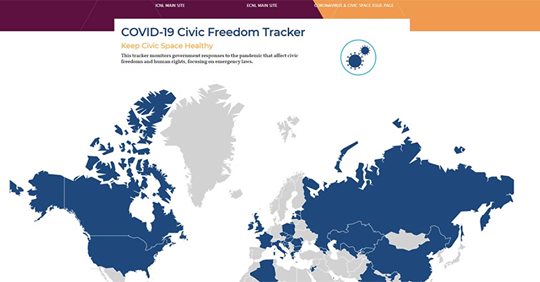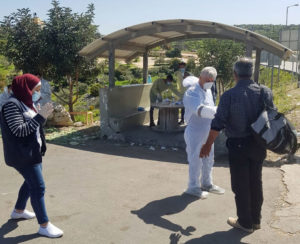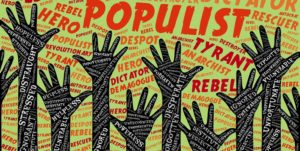
ICNL
A contagion on the scale of the coronavirus may offer authoritarians a greater opportunity than any event short of war, a senior fellow for Southeast Asia at the Council on Foreign Relations, writes for The Washington Post:
- It has no borders, and the sense of panic it creates is broader than that after a terrorist attack, which is designed to scare but usually targets one locale — and which has nowhere near the same economic impact.
- In a war or a natural disaster, average people can have some agency: They can volunteer to fight in a war or assist on the home front, or provide aid to an area slammed by a hurricane. But the virus leaves citizens powerless; to help others, all they can do is stay home, leaving them dependent on experts and officials to guide them — and unable to congregate publicly to protest a power grab.
- And while a war, a terrorist attack or a natural disaster may cause some areas to shutter, it does not usually close down an entire country, a shift that gives a leader the widest latitude.
- Finally, as autocrats like Cambodia’s Hun Sen have shown, a contagion provides an authoritarian a chance to stigmatize certain marginalized populations, scapegoating them for the disease.

Union-members-in-Palestine-check-workers’-health-as-they-return-from-jobs-in-Israel.-Credit-PGFTU
Just as the magnitude of the COVID-19 pandemic highlights the massive global economic and social inequality around the world, with workers in the informal economy and supply chains, and migrant workers—many of whom are women—especially marginalized, so, too, does it offer the potential to build more equal, inclusive and sustainable economies and societies that are more resilient in the face of pandemics, climate change and the many other global challenges, notes Tula Connell writes for the Solidarity Center, a core institute of the National Endowment for Democracy (NED).
As the novel coronavirus spreads, unions are demanding safe and healthy conditions for workers who must remain on the job, and that they be compensated during forced worksite closures, she adds, listing a sample of union actions around the globe. RTWT.

Orban Hungary, European People’s Party, Creative Commons
Hungary has become “a textbook case”, the example of how crises can provide fertile ground for authoritarian ends, adds The Covid-19 crisis is exploited by Viktor Orbán to consolidate power and undermine democracy, she writes for the UiOUiO C-REX – Center for Research on Extremism. The increasingly authoritarian Prime Minister has used the pandemic to further authoritarian ends. Democratic backsliding in Hungary has for long been a cause of concern for the European Union.
Keep Civic Space Healthy
The COVID-19 Civic Freedom Tracker, an initiative of the International Center for Not-for Profit Law (ICNL) monitors government responses to the pandemic that affect civic freedoms and human rights, focusing on emergency laws.

BPFG
The coronavirus crisis is a test of national leaders and international cooperation, and it has already injected a dramatic new energy and force into our political systems – sorting fair-weather populists from committed authoritarians, writes Sophia Gaston, Director of the British Foreign Policy Group. It is too early to be certain if it will stir conditions that deepen or undermine the Western populist challenge; however, it is clear that neither pathway is inevitable, she contends. Moreover, that the very real tensions and conflicts in societies, put on hold during the crisis, will still be waiting for us on the other side.







